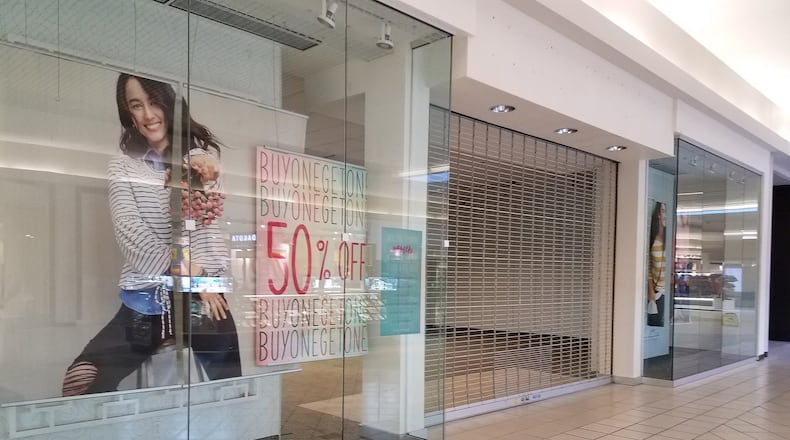Payless ShoeSource, Things Remembered, Crazy 8, Charlotte Russe and Gap stores are among some of the store closures already this year, leaving many soon-to-be vacant storefronts in local shopping centers. On Thursday, Victoria’s Secret and Abercrombie & Fitch announced they would adding to the list of closures
As of March 1, more than 4,300 stores have been planned for closure across the United States, according to Coresight Research. Since then, Family Dollar has announced plans to close an additional 390 stores and Charlotte Russe will shutter 400 more.
»BIZ BEAT: Liquidation sales start today at womens apparel store set to close at area malls
Many struggling retailers started 2019 on a rough note. Foot traffic dropped 10.7 percent nationally and nearly 18 percent in the Midwest in January compared to the same month in 2018 because of cold weather, according to research firm RetailNext.
Yet some stores are thriving, finding new importance in physical retail to fulfill online orders, drive extra sales and provide experiences for consumers who want shopping to be social rather than a chore.
»RELATED: Thousands of stores plan to close in 2019: Here's the listPhysical retail is not dying, but changing, Gough said. It's no longer about online shopping, brick-and-mortar stores or even the omnichannel strategy that includes a mix of the two. Instead, the new focus for major retailers is the "consumer channel," Gough said.
That’s a major benefit to shoppers as retailers across industries race to provide the best experiences shopping where, when and how the customers want. Those retailers that are thriving have consistent service across stores, apps and e-commerce, he said.
“Online sales are super heavy and that’s just the way the culture is going…but the guests still want to see the product, they want to feel the product,” said Alli Deyhle, manager of Target in Beavercreek.
More than anything, shoppers who choose to shop in store want experiences, said University of Dayton marketing professor Riley Dugan. Rather than major department stores like Elder-Beerman and Sears that put quality service behind for more cost-efficient models, shoppers want to go to small boutiques where a salesperson hand picks an outfit or pair of shoes, Dugan said.
»RELATED: Family Dollar closing nearly 400 stores, rebranding 200
Retailers are also adapting service to model stores like Best Buy where product experts can tell customers exactly what to get from a wide assortment based on their needs and price range, Gough said.
Other stores are working to position themselves as unique or local, with products shoppers can’t get anywhere else, including online.
Going to a local store like Dorothy Lane where shoppers scan a revolving inventory and look through locally made goods while trying samples of wine is an experience, unlike a weekly visit to the grocery store for the same products as a chore, Dugan said.
Target was among several successful retailers, including Walmart and TJX Companies, that reported both same-store sales growth and an increase in online shopping. E-commerce sales jumped 43 percent and 31 percent at Walmart and Target respectively from the fourth quarter of 2017 to the same period in 2018.
»BIZ BEAT: Miami University students to expand hemp-focused startup at local malls
As Target’s online sales grow, the stores become more important, not just for shopping but for fulfilling online orders within stores, Deyhle said. Each day Target locations are given a number of online orders that they are expected to fulfill to ship to customers. Nearly 75 percent of all online orders were fulfilled in stores in the fourth quarter of 2018, according to a company statement.
Traditional online retailers are learning the benefits of physical stores, too. A perceived enemy to brick-and-mortar, Amazon has been shaking the grocery industry since its acquisition of Whole Foods Market in the summer of 2017. Since then the company has reportedly made plans to launch a new grocery chain and is also opening small convenience Amazon Go stores, expanding Whole Foods locations and opening small-format book stores and locations that offer Amazon products rating more than four stars.
Others like popular eyeglass e-retailer Warby Parker, online mattress retailer Casper and furniture and home good shop Wayfair are experimenting with physical stores.
“So long as brick and mortar stores continue to change and evolve with their guests and the way the economy goes and culture goes —and that’s the best way to stay competitive — so long as we do that, brick-and-mortar stores themselves will stay around a long while,” Deyhle said.
FIVE FAST READS
• Ohio dairies closing amid four years of near record lows milk prices
• Gap to close 230 stores, split from Old Navy
• Victoria’s Secret closing more than 50 stores
• Luxury apartments, townhouses, carriage homes coming to Huber Heights
About the Author
